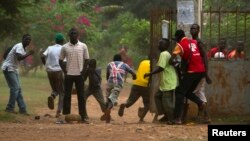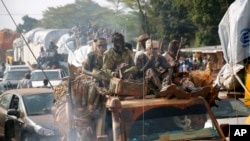Witnesses say a mob attacked and killed a Muslim man who was trying to flee from the Central African Republic, while a Christian was fatally beaten by Muslims in a separate incident.
Both attacks took place in the capital, Bangui, on Friday, the same day an International Criminal Court (ICC) prosecutor announced she had opened a preliminary probe into alleged "atrocities" in the CAR.
Witnesses say the Muslim man was fatally attacked after he fell off a truck that was part of a convoy carrying thousands of Muslims to neighboring Chad, a predominately Muslim country.
They say the attackers mutilated the man's body. Christian militia members tried to attack a second vehicle but were repelled by Burundian soldiers who are part of an African peacekeeping force in the CAR.
In a VOA interview, Doctors Without Borders emergency coordinator Martine Flokstra said another mob attack, allegedly involving Muslims, took place elsewhere in Bangui on Friday.
"Today has been quite a rocky day in Bangui," she said. "There has been another occasion near the transit camp. A man was lynched, and that was the opposite way around. So, somebody was seen as being a member of anti-Balaka and he got lynched by a group of Muslim men. So, we see it from both sides."
Last March, the Muslim Seleka rebel movement overthrew President Francois Bozize. Much of the violence in the CAR since then has been between ex-Seleka fighters and mostly Christian "anti-Balaka" militias.
On Wednesday, a mob in Bangui killed a man suspected of being a Muslim rebel before dragging his body through a street. Witnesses said CAR soldiers took part in the attack.
Flokstra says the incidents are evidence of rising tensions between Christians and Muslims, following Bozize's ouster.
"The situation is completely escalated. The Seleka, now the ex-Seleka, were doing a lot of violence against the Christian population," she said. "Now, it seems there is a retaliation going on."
ICC prosecutor Fatou Bensouda says she has opened a preliminary investigation into "serious crimes" in the CAR that could fall under the court's jurisdiction.
In a Friday statement, Bensouda said the plight of civilians in the country had "gone from bad to worst" since September 2012.
Bensouda said her office is reviewing reports of alleged atrocities that include killings, rapes and torture.
The U.N. humanitarian agency says nearly 900 people have been killed in Bangui alone since violence escalated in early December. The U.N. also says more than 800,000 people have been displaced.
On Friday, the U.N. refugee agency (UNHCR) said over the past ten days, nearly 9,000 people of various nationalities had crossed into Cameroon from the CAR.
Many of the new arrivals told UNHCR staff members they fled because of confrontations between ex-Seleka and anti-Balaka fighters.
The International Organization for Migration (IOM), which has been involved in efforts to evacuate non-CAR citizens from Bangui says it may have to discontinue its rescue flights.
The group says it needs $17.5 million for its humanitarian efforts in the CAR but, so far, has received only $2.5 million.
Both attacks took place in the capital, Bangui, on Friday, the same day an International Criminal Court (ICC) prosecutor announced she had opened a preliminary probe into alleged "atrocities" in the CAR.
Witnesses say the Muslim man was fatally attacked after he fell off a truck that was part of a convoy carrying thousands of Muslims to neighboring Chad, a predominately Muslim country.
They say the attackers mutilated the man's body. Christian militia members tried to attack a second vehicle but were repelled by Burundian soldiers who are part of an African peacekeeping force in the CAR.
In a VOA interview, Doctors Without Borders emergency coordinator Martine Flokstra said another mob attack, allegedly involving Muslims, took place elsewhere in Bangui on Friday.
"Today has been quite a rocky day in Bangui," she said. "There has been another occasion near the transit camp. A man was lynched, and that was the opposite way around. So, somebody was seen as being a member of anti-Balaka and he got lynched by a group of Muslim men. So, we see it from both sides."
Last March, the Muslim Seleka rebel movement overthrew President Francois Bozize. Much of the violence in the CAR since then has been between ex-Seleka fighters and mostly Christian "anti-Balaka" militias.
On Wednesday, a mob in Bangui killed a man suspected of being a Muslim rebel before dragging his body through a street. Witnesses said CAR soldiers took part in the attack.
Flokstra says the incidents are evidence of rising tensions between Christians and Muslims, following Bozize's ouster.
"The situation is completely escalated. The Seleka, now the ex-Seleka, were doing a lot of violence against the Christian population," she said. "Now, it seems there is a retaliation going on."
ICC prosecutor Fatou Bensouda says she has opened a preliminary investigation into "serious crimes" in the CAR that could fall under the court's jurisdiction.
In a Friday statement, Bensouda said the plight of civilians in the country had "gone from bad to worst" since September 2012.
Bensouda said her office is reviewing reports of alleged atrocities that include killings, rapes and torture.
The U.N. humanitarian agency says nearly 900 people have been killed in Bangui alone since violence escalated in early December. The U.N. also says more than 800,000 people have been displaced.
On Friday, the U.N. refugee agency (UNHCR) said over the past ten days, nearly 9,000 people of various nationalities had crossed into Cameroon from the CAR.
Many of the new arrivals told UNHCR staff members they fled because of confrontations between ex-Seleka and anti-Balaka fighters.
The International Organization for Migration (IOM), which has been involved in efforts to evacuate non-CAR citizens from Bangui says it may have to discontinue its rescue flights.
The group says it needs $17.5 million for its humanitarian efforts in the CAR but, so far, has received only $2.5 million.






